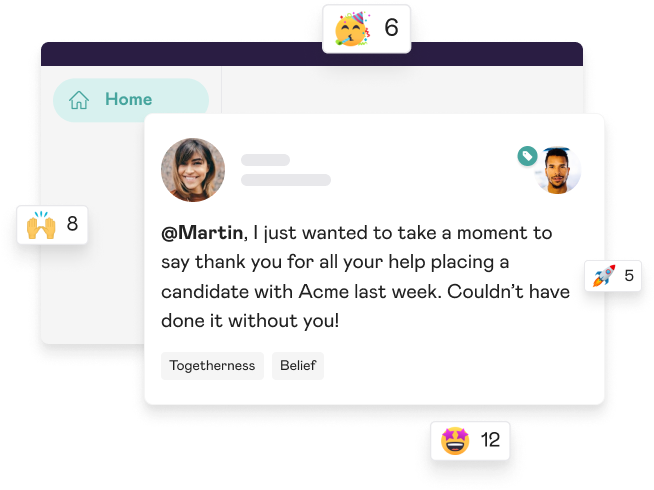A strong Employee Value Proposition (EVP) sets your company apart from the rest. If you’re struggling with retention or attracting quality candidates, you must create a compelling EVP.
This article will help you better understand the employee value proposition, how it can help you in the recruiting process and what qualities make a good employee value proposition.
Employee Value Proposition: Definition and Meaning
The employee value proposition is a unique set of offerings you provide for your employees in return for the skills, experience and qualities they bring to the position. The EVP will typically include your employee benefits, career development opportunities, financial rewards and any additional perks you may offer employees, like an extra day off for their birthday.
It also takes into consideration the company’s values and vision. An employee value proposition aims to excite employees about work and helps build the employer brand.
When candidates apply for jobs, they will look for companies with similar values. If your company has a strong employee value proposition that aligns with the candidate’s goals, that could help set you apart from the competition and attract top talent.
What’s the Difference Between EVP and Your Employer Brand?
The employee value proposition is internal, whereas your employer brand is external. Your employer brand is the face your company shows to the outside world as a potential employer.
It’s the sum of the different things people think when someone asks them what it would be like to work for your company. The employee value proposition is the face you show to your employees.
What Makes a Good Employee Value Proposition?
Strong employee value propositions help set you apart from the competition. It must be relevant to your company’s values and employees’ needs to make them feel proud, motivated and engaged.
To know what makes a strong EVP, you need to think beyond the salary packages you offer. Here are a few elements to consider:
- Financial rewards – Do you offer bonuses, annual salary reviews or monetary rewards like vouchers?
- Employee benefits – This includes how many holidays you offer employees, private health insurance, pension contributions, parental leave and more.
- Career development opportunities – Do you provide any free training resources to your employees or can you help them with their fees should they wish to continue studying?
- Monetary and non-monetary perks – This includes things like subsidising gym memberships, flexible working hours and work-from-home opportunities.
- Work environment – Do you prioritise the wellbeing of your employees, recognise their hard work and ensure they have a good work-life balance?
- Company culture – Are your team communicating and living the goals and values of your company?
Why is a Strong Employee Value Proposition Important?
So, now that you know what it is – why is it so important? We have mentioned that it sets you apart from your competitors, but here are a few other reasons:
1. Attract and Retain the Top Talent
A strong EVP will help you attract and retain the best employees possible to help grow your business. It’ll help you attract new employees with goals and values aligned with your company.
When done right, the compelling EVP acts as a window into what it’s like to work in your team, ensuring the role is attractive to candidates and giving them a preview of company culture, so they know whether they will be a good fit.
2. Improves Your Reputation
A strong employee value proposition will help elevate your entire reputation, making your organisation a more desirable place to work.
We’ve all heard the gossip of businesses claiming to be something they’re not and having a negative reputation beneath it all. Employees talk, and you want them to have a good word to say about your business, not a bad one.
These days, many job sites such as Otta now list a company’s Glassdoor rating directly on the job ad. Savvy candidates will also seek out reviews of your company before applying for a role. Dissatisfied current or former staff will share their negative experiences, which can damage your brand and your chances of hiring top talent. Change needs to come from the top to create a positive culture. A generous EVP can be a tool to help drive this change.
3. Reduces Churn
Company reputation matters more than ever. Did you know that 86% of workers would not apply for or continue to work for a company with a bad reputation amongst former employees or even the general public?
Many job seekers are looking for positive employer branding, so it’s crucial to pay attention to yours. According to Gartner, organisations that effectively deliver on their EVP can decrease annual employee turnover by 69%.
4. Improves Employee Experience
An organisation’s EVP impacts the overall employee experience in the workplace. When companies are employee-driven, they define their value propositions based on their workforce. The ability to focus on what your people truly care about brings the biggest competitive advantage.
What to Consider When Developing an Employee Value Proposition
When developing an EVP for your company, there are a few things to consider. A good place to start would be to ask your current employees what they think about working for your company – what’s great and what could be improved?
Anonymous employee surveys can help gather valuable feedback and figure out where to start – why would you start from scratch when there are things your employees wouldn’t change?
Here are a few other things to consider when developing your employee value proposition:
1. Rewards and Recognition
According to numerous studies, saying ‘thank you’ has always been more important than salary. Employees want a sense of belonging and a feeling of being appreciated. The same goes for candidates applying for your company – they want rewards, recognition and other benefits associated with the job.
Long story short, they’re looking at the whole compensation package, not just the salary splashed across a job ad.
Making them feel like their job matters from the beginning is crucial because this is also a key driver for employee engagement later down the line. Great people also want the chance to work with great people, and creating a positive work environment is a surefire way to get employees excited about coming to work every day.
Transform your culture with Mo

- Improve employee engagement scores
- Reduce employee churn
- Build a collaborative culture
2. Culture
No matter how you define it, company culture is vital, and we aren’t the only ones who think so. Deloitte found that 88% of employees believe a distinct workplace culture is important to business success.
A strong company culture that you can show off to prospective employees from the start gives new hires an expectation of what it’s like working for your company. Do you organise monthly activities for your team, run competitions or offer rewards? Showcase them!
3. Salary
There is no denying that an attractive salary is important. People have bills to pay and mouths to feed! But a big no when building your employee value proposition is inflating salaries because of huge competition in the market.
You cannot compete with your competitors for talent purely because you offer the best salary of them all. Not only that, it burns up the budget. When looking at the employee value proposition, salary should not be the sole focus.
You also don’t want to undervalue potential employees. If HR fails to keep track of employees’ core skills, development and learning, it risks undervaluing the team.
Creating a Great Employee Value Proposition
Now that we have helped you understand what makes a strong EVP and why you need it, it makes the complex task of building one a lot easier. Here are a few steps you can take to build a great employee value proposition for your business:
1. Start with Your Current Offering
EVP development needs to start with the basics. First, you must take a look at what you’re currently offering. Earlier in the article, we detailed what makes a good EVP. Use this to help make a list of what your company currently offers and what you could potentially add to the list.
It’s always good to get insight from your employees about how well the company is doing and what it could be doing better.
2. Interview Past and Existing Employees
Knowing what your company offers and can offer is very important for building a strong employee value proposition. We previously talked about surveying your employees, and it might also be worth considering surveying your past employees to understand what the company could have done to help them stay.
In the survey, you could ask questions like:
- Why do/did you like working here?
- What motivates/motivates you?
- If there was one thing you could change, what would it be?
- What kind of support would you like to further your career development?
Then, you can use the feedback to build a better job offering for potential employees.
It’s important to consolidate and test your findings with new hires to see if your EVP aligns with their experience so far. Smooth out any bumps and get more feedback.
3. Write Out Your EVP
Once you’ve identified how your company differs from the competition and what employee experience you deliver, the next step is to write out your EVP statement. It must be clear, inspirational and unique to your company to help attract the right people.
Also, ensure your EVP aligns with your employees and the company’s expectations.
4. Implementation
Once you’ve got it all down on paper, it’s time to get the marketing team involved to ensure it ties in nicely with your company mission and overall brand.
You must decide how exactly you want to communicate your employee value proposition through external channels. Once it’s finalised, roll it out to the entire company.
Even your current employees need to be reminded why working at your company is so awesome.
Employee Value Proposition: Key Takeaways
- Employee Value Proposition (EVP) is a set of offerings provided to employees in return for their skills and contributions, including benefits, career development opportunities, financial rewards and company values.
- A good EVP aligns with company values, meets employees’ needs and helps attract and retain top talent by showcasing the company’s culture and reputation.
- Developing a strong EVP involves assessing current offerings, gathering feedback from past and current employees, writing out the EVP statement and implementing it effectively across internal and external channels to attract and retain quality candidates.




